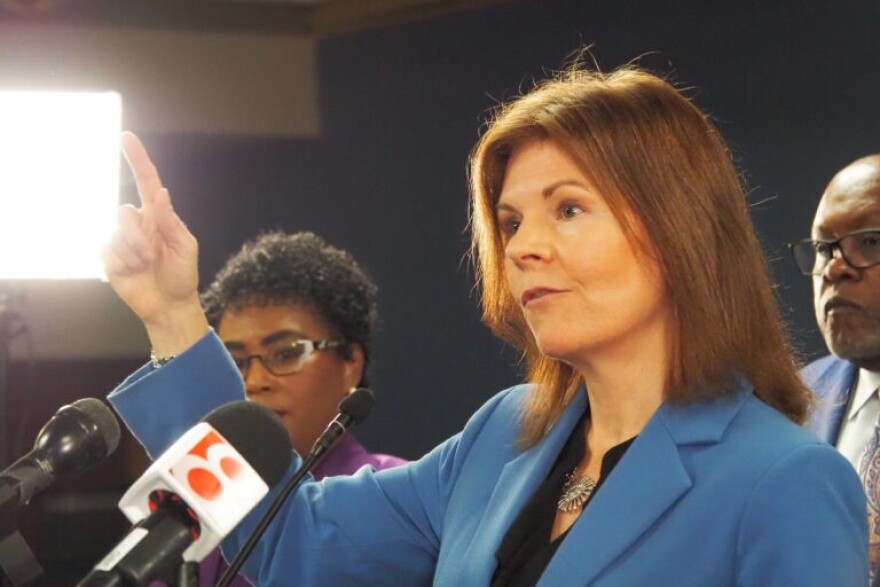Hoosiers seeking abortions now face another legal barrier following a June Texas ruling — a decision that blocked a Biden administration reproductive privacy rule nationwide.
“This is another legal blow to reproductive privacy and health care privacy for women, and I’m really concerned,” said Rep. Carey Hamilton, D-Indianapolis.

She worries Attorney General Todd Rokita, who has hailed the ruling, will take advantage of it.
The issue started in 2024 when health officials under former President Joe Biden enacted the Health Insurance Portability and Accountability Act privacy rule to boost protections and block law enforcement from getting medical records of patients seeking legal abortions or gender-affirming care.
In June, a federal judge in Texas overturned that rule, finding the U.S. Department of Health & Human Services acted unlawfully when expanding the HIPAA privacy law.
States Newsroom reported that, without the rule, law enforcement officials in states with abortion bans may issue subpoenas for records related to reproductive health care obtained legally in another state. According to health policy nonprofit KFF, 22 states and the District of Columbia have laws limiting what reproductive health information can be obtained — but others, like Indiana, don’t.
Some states have already attempted to track abortion seekers.
According to the Associated Press, a suburban Chicago police department allegedly shared data from automatic license-plate readers with a Texas sheriff seeking a woman who had an abortion. The Illinois secretary of state is investigating the police department.
“Since Roe (v. Wade) was overturned, patients are rightfully afraid that if their state bans abortion, it may attempt to target or prosecute them for obtaining an abortion in other states. Anticipating this situation, the recently vacated rule enhanced health care data privacy protections against disclosure to law enforcement,” said Amy Myrick, senior counsel at the Center for Reproductive Rights. “While HIPAA still provides basic protections for your health care data, this openly anti-abortion ruling is yet another blow against the basic freedom to make decisions about your own body and health care.”
Abortion in Indiana
An Indiana Department of Health report released in April showed a total of 146 abortions occurred in 2024 – a 98% decrease from 2022.
Indiana’s near-total abortion ban, which took effect in August 2023, outlaws abortion except in cases of fatal fetal anomalies and serious health risks to the mother. Victims of rape or incest are also allowed to access abortion care up to 10 weeks post-fertilization. The law mandates that hospitals perform all abortions. While performing an illegal abortion is a felony for doctors in Indiana, women seeking abortions face no criminal penalties.
FDA-approved abortion pills remain accessible by mail nationwide.
Indiana law also requires that providers who perform abortions file terminated pregnancy reports with the state health agency. They’re due within 30 days if the patient is 16 or older, and within three days if younger than 16. Each of the reports should include demographic, medical and procedural information.
In January, Indiana Gov. Mike Braun signed new executive orders on abortion records to ensure the laws are “fully and faithfully executed,” including for terminated pregnancy report submissions. It also required a new IDOH state report, recommended financial penalties for noncompliant hospitals and greater state oversight by health officials.
Hoosiers traveling to seek care
Illinois — which has protected abortion access as a fundamental right — is a top destination for Hoosiers seeking the procedures. Since Indiana’s abortion ban went into effect, there has been a five-fold increase in patients traveling to Illinois, according to Planned Parenthood of Illinois.
At Planned Parenthood’s Carbondale Health Center, 90% of patients seen are from another state.
In 2024, 9,500 Indiana residents traveled to nearby states to obtain abortions, according to the Guttmacher Institute, an abortion-rights research and policy group. Principal Federal Policy Adviser Anna Bernstein said the 2024 rule from the Biden administration strengthened privacy protections for patients seeking reproductive health care.
Indiana residents are already being denied abortion care in their state — vacating this rule will likely only mean more infringements on their bodily autonomy.Anna Bernstein of the Guttmacher Institute
“By vacating this rule, Judge (Matthew) Kacsmaryk has removed critical protections for patients seeking abortion care at a time when criminalization of patients and providers is increasing. The 2024 rule prohibited the use and disclosure of protected health information for care that was lawfully provided,” Bernstein said. “Without this rule, patients like those traveling out of state for care could be at greater risk for law enforcement involvement for seeking necessary health care.”
State lawmaker Hamilton said that, as legal rulings come down, doctors fear providing life saving care to women who are pregnant. And as doctors see health care and reproductive deserts grow in Indiana, she feared that women will struggle even more to find emergency care when something goes wrong during pregnancy.
Indiana University Associate Professor of Clinical Obstetrics & Gynecology Dr. Caroline Rouse said she is concerned about the erosion of reproductive health care privacy laws and thinks it’s important for everyone to spread awareness. She said that a doctor-patient relationship is critical.

“I am very concerned about patients suffering consequences of that and concerned about patients not even seeking the care that they need and suffering the consequences of not getting that care,” she said.
OBGYN Dr. Amy Caldwell said current Indiana law does not give the attorney general grounds to demand records from neighboring states.
“The intent of overturning laws like this is to scare women,” she said. “Physicians will never turn over a patient’s record unless there is a court order and patients should always feel empowered to access their records.”
Rokita, meanwhile, has celebrated the ruling and how it impacts Indiana reporting.
That’s because several doctors performing abortions in Indiana have refused to file terminated pregnancy reports since the federal rule went into effect. Litigation is ongoing.
“We’re moving forward with our goal to protect life and working to undo the many setbacks created by the Biden administration,” Rokita said in a statement. “We’ve been closely watching the Texas case and updated the Indiana court of the decision there, so we look forward to having a positive outcome in our case. This is a major win for women and for physicians because it would take away an excuse thrown up by abortionists for not complying with state law.
Indiana Capital Chronicle is part of States Newsroom, a nonprofit news network supported by grants and a coalition of donors as a 501c(3) public charity. Indiana Capital Chronicle maintains editorial independence. Contact Editor Niki Kelly for questions: info@indianacapitalchronicle.com.



